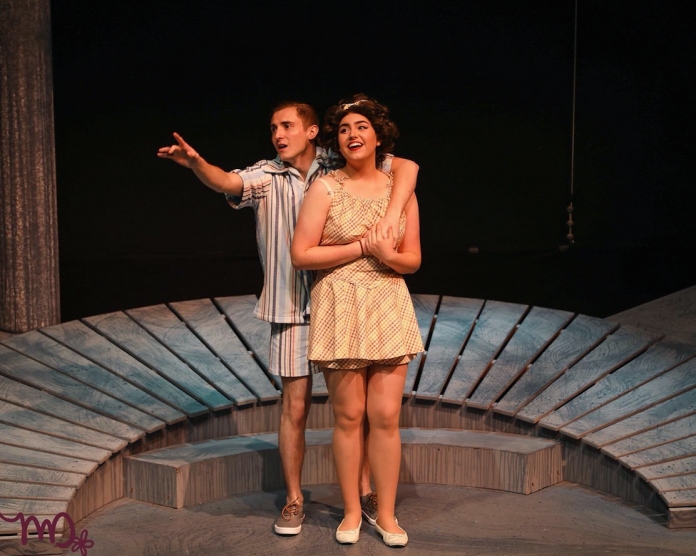The medical term for the disorder is congenitalus amusia, and if anybody has it, Eurydice does. She keeps musical time about as well as a cuckoo clock with a couple broken springs, opting instead for the beauty of the printed word amid the need for art in her life — a decided compromise for her fiancé Orpheus, who always has birdsong, the sound of the sea and about 711 tunes spinning around in his head.
The Lord of the Underworld will make short work of it all when she seduces Eurydice unto her death — on her wedding day, of all days — in Sarah Ruhl’s “Eurydice,” a highly stylized look at the staple love story that finds Eurydice reunited in the Lord’s kingdom with her dead father.
The Grossmont College Theatre Arts Department is up to the task here, thanks largely to Alexa Wolfe’s turn in the title role — the character is clearly confounded between the life Orpheus can promise her aboveground and the thrill of the new start she has with dad, who reintroduces his daughter’s earthly memories (however painful). The father-daughter relationship is key to the play’s raison d’être (Ruhl wrote it after her father had died), and Wolfe responds especially well to director Matthew Salazar Thompson’s takes on subtext and the modern-ish characters around it.
Very good show, one whose weirdness is cleverly outdone by its theatricality.
My lips are sealed as to whether the grieving Orpheus retrieves his betrothed from the depths, but to a certain extent, that part of the plot line doesn’t really matter so much as the path surrounding Eurydice’s descent into death. Love, loss and the memories around them are what’s key here, mitigated as they are by a chorus of stones, who insist on adherence to a code of amnesia among the dead (Eurydice can’t even cry in acknowledgment of what’s happened to her).
But Ruhl won’t be denied her vision of a quirky, bodacious afterlife, and Thompson obliges with collages of people, music and carefully chosen themes. Ryan Yerger’s featherbrained Orpheus is a likely target for one so charmed by life as Eurydice; Claire Sparr’s Lord of the Underworld is intriguingly amorphous. The question mark is Joel Castellaw, who makes a good Father within the context of the show — but we get very little of dad’s sketchier side, the one that would have warranted his arrival into the Underworld in the first place.
Michael McKeon’s scene design adheres to the play’s darker side, as if to endorse Ruhl’s optimism through it all. The rest of the tech is fine, with costumer Jaz Sveum having conceived the stones’ attire to picture perfection.
Oddly, there’s no first author of the Orpheus/Eurydice myth, but there could have been, and it would have fit quite nicely within the canon. Author Hugh Lupton told the story in a book published in 2013, and three composers adapted it for opera. Here, Ruhl brings it to life through anything but naturalistic speechifying and conventional narrative — it’s ripe for the theatrical taking, to say nothing of the giving.
This review is based on the performance of Nov. 16. “Eurydice” runs through Nov. 23 at Grossmont College’s Stagehouse Theatre, 8800 Grossmont Blvd., El Cajon. $10-$15. (619) 644-7234, grossmont.edu.














